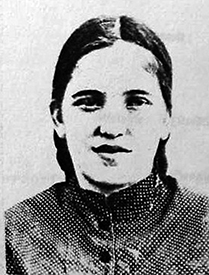Search for Names, Places and Biographies
Already layed Stumbling Stones
Suche
Marie Weber * 1909
Ritterstraße 29 (Wandsbek, Eilbek)
HIER WOHNTE
MARIE WEBER
JG. 1909
EINGEWIESEN 8.4.1935
ALSTERDORFER ANSTALTEN
‚VERLEGT’ 16.8.1943
HEILANSTALT
AM STEINHOF WIEN
TOD AN DEN FOLGEN
14.6.1945
Marie Weber, b. 5.29.1909 in Hamburg, died on 6.14.1945 in the Wagner von Jauregg "Medical and Nursing Home” of Vienna
Ritterstraße 29 (Ritterstraße 31)
On 28 October 1921, the widow Röhrs applied for admission of her "weak-minded” granddaughter, Marie Weber, to an institution. Marie was twelve years old and had been excused from the obligation to attend school. She lived with her grandmother because "of the violent character of her father whom the child feared. Marie is good natured and clean.” On 27 February 1922, Marie was admitted to the then Alsterdorf Institute, with the Welfare Office bearing the costs.
Marie’s father, the butcher Robert Weber, b. 1873, came from an inn keeping family in Gardessen near Brunswick; her mother, Frieda, née Rohrs, was eight years younger than her husband and came from a Hamburg cabinet maker’s household. They married on 20 August 1908 and moved to Sternstrasse 19 in St. Pauli, where on 29 May 1909, she gave birth to Marie, the first of four children. Marie was baptized on 27 July 1909 in the Evangelical communal church of St. Pauli.
At a year old she could walk; at a year and a half, she could speak. In essence she was pleasant and easy to get along with. However, she lagged behind in mental development. She was enrolled in a regular public school which she left without having learned to read or write. Her sister Else died at five from scarlet fever; a brother and another sister grew up without abnormalities.
Marie Weber’s stay at Alsterdorf ended after nine months in November 1922 at the wish of her parents. In the meantime, the family had moved to Eilbek. However, her parents brought Marie back to Alsterdorf after a year. Her need for assistance and her unpredictable behavior overtaxed her mother. After three years in Alsterdorf, during which the hoped for development did not take place, the Institute directory informed Marie’s father that she was no longer suited for the Alsterdorf Institute: "her state of excitability in which she acts out violently against her surroundings has increased markedly in the last few weeks. We must therefore transfer her to the Friedrichsberg State Hospital.”
In Friedrichsberg it was determined that the cause of Marie Weber’s excitability was her extreme sensitivity to noise. In quiet surroundings she was cheerful and friendly and performed her work in the vegetable cellar with perseverance. She won recognition for her musicality, her playing the harmonica, and her attentive listening when the piano was played, during which she moved her upper body along with the rhythm.
In 1932, Marie Weber was declared incompetent. Three years later, on 3 April 1935, she returned from Friedrichsberg to the Alsterdorf Institute. A guardian was appointed to regulate her financial affairs. Aside from an episode in which a fire broke out and she became so excited that she had to sleep in the observation room (see biographical entry for Harry Becker), the years passed as at Friedrichsberg. She loved to hear music, was cheerful, gave cause for cheerfulness in others, and occupied herself with little activities. "She must be handled with kindness,” according to one of the few entries in her records. That was from 13 April 1943. Without obvious causes, from July 1939, when she was at her maximum weight of a little over 158 lbs., to August 1943, she lost 44 lbs. Contrary to the observation that she needed to be handled with kindness, she was a few months later, on 16 August 1943, sent with 228 girls and women from Alsterdorf to the Wagner von Jauregg "Medical and Nursing Home” of Vienna. Upon her arrival she remained silent when the doctors asked questions.
Marie Weber’s mother was bombed out of her home in the Hamburg air raids of July 1943; she was evacuated to the Upper Palatinate. It was not until April 1944, that she again made contact with her daughter. The Institute directors in Vienna reported that Marie was always calm and occupied herself with mechanical household tasks. They mentioned that her body weight was unchanged. In January 1945 Marie was transferred to the nursing home. That is where she was when the war ended. By June 1945, her weight was down to 86 lbs., she was frail, and suffered from violent bouts of diarrhea which led to her wasting away and, on 14 June 1945, her death. She was 36 years old.
Translator: Richard Levy
Kindly supported by the Hermann Reemtsma Stiftung, Hamburg.
Stand: May 2019
© Hildegard Thevs
Quellen: Ev. Stiftung Alsterdorf, Archiv, V 217; StaH 332-5 Standesämter 3113-428/1908; Jenner, Meldebögen, in: Wunder/Genkel/Jenner, Wunder, Genkel, Jenner, Auf dieser schiefen Ebene; Wunder, Abtransporte, in: Wunder, Genkel, Jenner, Auf dieser schiefen Ebene; ders., Exodus, ebd.


